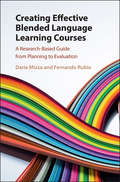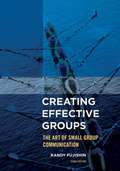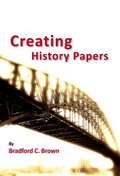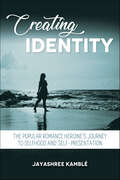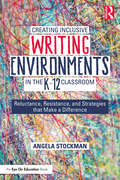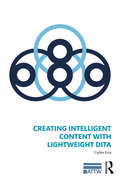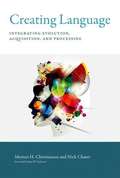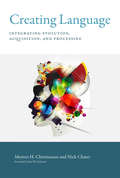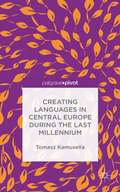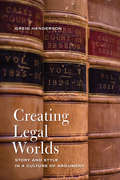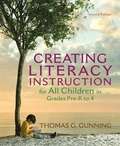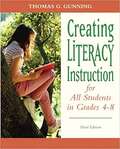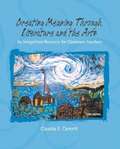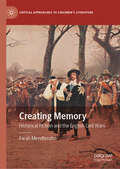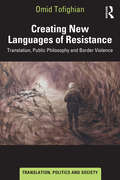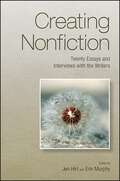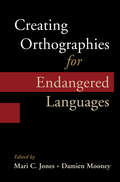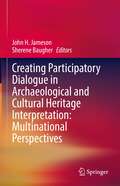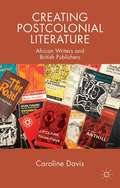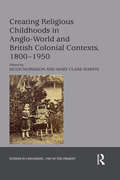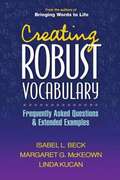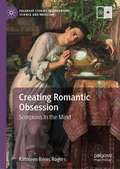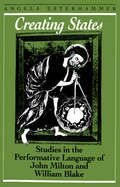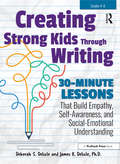- Table View
- List View
Creating Effective Blended Language Learning Courses: A Research-Based Guide from Planning to Evaluation
by Daria Mizza Fernando RubioBlended language courses, which combine face-to-face and online instruction, are becoming increasingly popular due to the need for more flexible yet effective learning opportunities. This book recognizes the associated opportunities and challenges for teachers, and provides the rationale, strategies and tools to design blended learning courses or to guide the transition from fully face-to-face or fully online courses to blended instruction. The authors propose a framework based on four phases, Design, Build, Teach and Evaluate, which facilitates a systematic approach to course development. The volume simplifies the connection between theory and practice, by including examples that readers can relate to and immediately implement as they build or teach a course. Including case studies of successful implementations, and effective instructional strategies and techniques, this book is accessible even for teachers without previous experience in course design, whilst also acting as a reference for more experienced language educators.
Creating Effective Groups: The Art of Small Group Communication (Third Edition)
by Randy FujishinThis practical book gives students the fundamental knowledge and skills necessary to communicate more effectively and interact more productively in the small group setting. With the help of this book, any group member can learn the skills necessary to participate in and lead a task group in an effective, productive, and healthy manner. This third edition features all new sections on: . "The Power of Diversity" . "Critically Thinking About Yourself As A Communicator" . "Defensive vs. Supportive Climates" . "Ethical Communication" . "Time Management" . "Impromptu Speaking" . "The Spirit of Collaboration" As well as new end chapter exercises in several chapters focusing on Online Resources and Social Media. "
Creating History Papers (Students And Professional Concerns)
by Bradford BrownThis reference guide is a must-read for all history students that addresses the howsof history papers, and presents technical information to aid in the process of researching, writing, and documenting.
Creating Identity: The Popular Romance Heroine's Journey to Selfhood and Self-Presentation
by Jayashree KambléWhile the world often categorizes women in reductive false binaries—careerist versus mother, feminine versus fierce—romance novels, a unique form of the love story, offer an imaginative space of mingled alternatives for a heroine on her journey to selfhood.In Creating Identity, Jayashree Kamblé examines the romance genre, with its sensile flexibility in retaining what audiences find desirable and discarding what is not, by asking an important question: "Who is the romance heroine, and what does she want?" To find the answer, Kamblé explores how heroines in ten novels reject societal labels and instead remake themselves on their own terms with their own agency. Using a truly intersectional approach, Kamblé combines gender and sexuality, Marxism, critical race theory, and literary criticism to survey various aspects of heroines' identities, such as sexuality, gender, work, citizenship, and race. Ideal for readers interested in gender studies and literary criticism, Creating Identity highlights a genre in which heroines do not accept that independence and strong, loving relationships are mutually exclusive but instead demand both, echoing the call from the very readers who have made this genre so popular.
Creating Inclusive Writing Environments in the K-12 Classroom: Reluctance, Resistance, and Strategies that Make a Difference
by Angela StockmanTimely and accessible, this book offers tangible strategies that will help teachers plan and sustain writing workshop experiences that are responsive to the needs of their specific students. Angela Stockman helps teachers understand why some writers may fail to meet their expectations and how to help all writers reach their fullest potential. Organized in three parts, this book reframes common narratives about resistant writers, empowers teachers to design, lead and refine their workshop, and provides a toolkit to do so. The appendices and eResources included provide teachers with instructions for mini-lessons and learning targets that support multimodal composition, perfect for pre-service and in-service teachers.
Creating Intelligent Content with Lightweight DITA (ATTW Series in Technical and Professional Communication)
by Carlos EviaCreating Intelligent Content with Lightweight DITA documents the evolution of the Darwin Information Typing Architecture (DITA) – a widely used open standard for structuring technical content. DITA has grown in popularity and features since its origins as an internal grammar for structuring technical documentation at IBM. This book introduces Lightweight DITA (LwDITA, which should be read as "Lightweight DITA") as a proposed version of the DITA standard that reduces its dependence on complex Extensible Markup Language (XML) structures and simplifies its authoring experience. This volume aims to reconcile discrepancies and similarities in methods for authoring content in industry and academia and does so by reporting on DITA’s evolution through the lens of computational thinking, which has been connected in scholarship and media to initiatives for learning to code and programming. Evia’s core argument is that if technical communicators are trained with principles of rhetorical problem solving and computational thinking, they can create structured content in lightweight workflows with XML, HTML5, and Markdown designed to reduce the learning curve associated with DITA and similar authoring methodologies. At the same time, this book has the goal of making concepts of structured authoring and intelligent content easier to learn and teach in humanities-based writing and communication programs. This book is intended for practitioners and students interested in structured authoring or the DITA standard.
Creating Language: Integrating Evolution, Acquisition, and Processing
by Nick Chater Peter W. Culicover Morten H. ChristiansenLanguage is a hallmark of the human species; the flexibility and unbounded expressivity of our linguistic abilities is unique in the biological world. In this book, Morten Christiansen and Nick Chater argue that to understand this astonishing phenomenon, we must consider how language is created: moment by moment, in the generation and understanding of individual utterances; year by year, as new language learners acquire language skills; and generation by generation, as languages change, split, and fuse through the processes of cultural evolution. Christiansen and Chater propose a revolutionary new framework for understanding the evolution, acquisition, and processing of language, offering an integrated theory of how language creation is intertwined across these multiple timescales.Christiansen and Chater argue that mainstream generative approaches to language do not provide compelling accounts of language evolution, acquisition, and processing. Their own account draws on important developments from across the language sciences, including statistical natural language processing, learnability theory, computational modeling, and psycholinguistic experiments with children and adults. Christiansen and Chater also consider some of the major implications of their theoretical approach for our understanding of how language works, offering alternative accounts of specific aspects of language, including the structure of the vocabulary, the importance of experience in language processing, and the nature of recursive linguistic structure.
Creating Language: Integrating Evolution, Acquisition, and Processing
by Nick Chater Morten H. ChristiansenA work that reveals the profound links between the evolution, acquisition, and processing of language, and proposes a new integrative framework for the language sciences.Language is a hallmark of the human species; the flexibility and unbounded expressivity of our linguistic abilities is unique in the biological world. In this book, Morten Christiansen and Nick Chater argue that to understand this astonishing phenomenon, we must consider how language is created: moment by moment, in the generation and understanding of individual utterances; year by year, as new language learners acquire language skills; and generation by generation, as languages change, split, and fuse through the processes of cultural evolution. Christiansen and Chater propose a revolutionary new framework for understanding the evolution, acquisition, and processing of language, offering an integrated theory of how language creation is intertwined across these multiple timescales.Christiansen and Chater argue that mainstream generative approaches to language do not provide compelling accounts of language evolution, acquisition, and processing. Their own account draws on important developments from across the language sciences, including statistical natural language processing, learnability theory, computational modeling, and psycholinguistic experiments with children and adults. Christiansen and Chater also consider some of the major implications of their theoretical approach for our understanding of how language works, offering alternative accounts of specific aspects of language, including the structure of the vocabulary, the importance of experience in language processing, and the nature of recursive linguistic structure.
Creating Languages in Central Europe During the Last Millennium
by Tomasz KamusellaAfter 1918 Central Europe's multiethnic empires were replaced by nation-states, which gave rise to an unusual ethnolinguistic kind of nationalism. This book provides a detailed history and linguistic analysis of how the many languages of Central Europe have developed from the 10th century to the present day.
Creating Legal Worlds
by Greig HendersonA legal judgment is first and foremost a story, a narrative of facts about the parties to the case. Creating Legal Worlds is a study of how that narrative operates, and how rhetoric, story, and style function as integral elements of any legal argument.Through careful analyses of notable cases from Canada, the United States, and the United Kingdom, Greig Henderson analyses how the rhetoric of storytelling often carries as much argumentative weight within a judgement as the logic of legal distinctions. Through their narrative choices, Henderson argues, judges create a normative universe - the world of right and wrong within which they make their judgements - and fashion their own judicial self-images. Drawing on the work of the law and literature movement, Creating Legal Worlds is a convincing argument for paying close attention to the role of story and style in the creation of judicial decisions.
Creating Literacy Instruction For All Children In Grades Pre-K to 4
by Thomas G. GunningIn response to today's need to tailor instruction for the lower grades (PreK-4), this comprehensive, practical guide gives aspiring and practicing professionals the methods and techniques they need to become highly effective teachers who are well equipped to help all students become proficient readers and writers. Creating Literacy Instruction for All Children in Grades Pre-K to 4 features lesson plans for virtually every major literacy skill or strategy, abundant lists of recommended children's reading, helpful student strategies, numerous reinforcement activities, and real-life illustrations of exemplary teaching, all designed to help teachers incorporate today's most effective teaching methods and techniques into their literacy teaching.
Creating Literacy Instruction For All Students In Grades 4 To 8
by Thomas G. GunningCreating Literacy Instruction for All Students in Grades 4 to 8 gives teachers the best available teaching strategies and sample step-by-step lesson plans for constructing lively, effective reading and writing instruction for all students. With his focus on teaching successfully in today’s diverse classrooms, renowned author Thomas Gunning gives teachers a head start in ensuring quality literacy instruction for all children.
Creating Meaning Through Literature and the Arts: An Integration Resource for Classroom Teachers (Third Edition)
by Claudia E. CornettThe most comprehensive text on arts integration in the market, this bestseller redefines literacy in light of the 21st century need for multiple literacies. It provides an overview of academically linked research in five arts areas: literary arts, visual art, drama, dance, and music, and is intended as a complete introduction to how to meaningfully use the arts as teaching tools on a daily basis in every curricular area. Organized around WHAT, WHY and HOW questions, Creating Meaning through Literature and the Arts, 5/e tells the story of how arts integration (AI) has grown so much in a few decades using the story of hundreds of arts-based schools–old and new, public, magnet, and charter, today’s. Each AI school story draws upon cutting edge research, evolving state standards, and constructivist beliefs to transform teaching and learning. The Enhanced Pearson eText features video resources.
Creating Memory: Historical Fiction and the English Civil Wars (Critical Approaches to Children's Literature)
by Farah MendlesohnThis book considers the English Civil Wars and the civil wars in Scotland and Ireland through the lens of historical fiction—primarily fiction for the young. The text argues that the English Civil War lies at the heart of English and Irish political identities and considers how these identities have been shaped over the past three centuries in part by the children’s literature that has influenced the popular memory of the English Civil War. Examining nearly two hundred works of historical fiction, Farah Mendlesohn reveals the delicate interplay between fiction and history.
Creating New Languages of Resistance: Translation, Public Philosophy and Border Violence (Translation, Politics and Society)
by Omid TofighianOmid Tofighian has been engaged in collaborative philosophical, artistic and political work with displaced, exiled and incarcerated peoples for 25 years. These interdisciplinary and transdisciplinary collaborations include co-authoring different genres of writing in English; co-creation and translation into English; and shared intellectual and artistic projects. The most notable example is his translation and collaboration in Behrouz Boochani’s award winning book No Friend but the Mountains: Writing from Manus Prison (2018).Creating New Languages of Resistance is an intellectual and personal reflection on creative resistance; it addresses critical issues pertaining to epistemic injustice, kyriarchy and border violence. Incorporating scholarship, different literary genres, exclusive interviews, media articles and notes on translation, this rigorous and accessible study examines the ‘shared philosophical activity’ Tofighian participates in with different collaborators. It suggests experimental and collaborative ways for producing and analysing similar texts and cultural productions; creates new spaces and frameworks for thinking about displacement and exile; and raises compelling questions and issues for people interested in researching and working to end border violence, bordering and intersectional discrimination.Presenting a special rationale and philosophical vision about collaboration and co-creation in extreme situations, this is key reading for students, scholars and general readers interested in critical and cultural border studies, translation studies, public philosophy, literatures of resistance, coloniality and decoloniality, identity and positionality.
Creating Nonfiction: Twenty Essays and Interviews with the Writers (Excelsior Editions)
by Jen Hirt; Erin MurphyGold Winner for Anthologies, 2016 Foreword INDIES Book of the Year AwardsWith a title that suggests both the genre and the process of composing it, Creating Nonfiction is a collection of essays and interviews that aims to open readers' and writers' eyes to the formal possibilities of creative nonfiction. Included are memoirs, personal essays, literary journalism, graphic essays, and lyric essays, and the content is equally diverse, with topics ranging from childbirth to child labor, from dandelions to domestic violence.Whereas most anthologies leave readers to speculate about the evolution of each contribution, Creating Nonfiction provides companion interviews that offer insight into the inspiration, drafting, and revision process that produced the essays. Cheryl Strayed talks about how working as a reporter for her hometown newspaper influenced her later writings. Dinty W. Moore reflects on the delicate balance between observation and judgment when writing about subjects whose values differ from your own. Kristen Radtke explains how she decides between textual and visual images when creating a graphic essay. Although they offer an eclectic mix of voices and styles, what these essays all have in common is that ultimately, as contributor Faith Adiele observes, "truth becomes art."
Creating Orthographies for Endangered Languages
by Jones Mari C. Damien MooneyCreating an orthography is often seen as a key component of language revitalisation. Encoding an endangered variety can enhance its status and prestige. In speech communities that are fragmented dialectally or geographically, a common writing system may help create a sense of unified identity, or help keep a language alive by facilitating teaching and learning. Despite clear advantages, creating an orthography for an endangered language can also bring challenges, and this volume debates the following critical questions: whose task should this be - that of the linguist or the speech community? Should an orthography be maximally distanciated from that of the language of wider communication for ideological reasons, or should its main principles coincide for reasons of learnability? Which local variety should be selected as the basis of a common script? Is a multilectal script preferable to a standardised orthography? And can creating an orthography create problems for existing native speakers?
Creating Participatory Dialogue in Archaeological and Cultural Heritage Interpretation: Multinational Perspectives
by Sherene Baugher John H. JamesonThis volume examines evolving trends and transnational perspectives on public interpretation of archaeological and cultural heritage, as well as levels of communication, from local to regional, national and international. It is presented in the context of the evolution of cultural heritage studies from the 20th century “expert approach” to the 21st century “people-centered approach,” with public participation and community involvement at all phases of the decision-making process. Our premise is not just about bringing in community members to be partners in decision making processes; some projects are being initiated by the community--not the heritage experts. In some instances, community members are central in initiating and bringing about change rather than the archaeologists or heritage specialists. In several cases in the book, descendants take the lead in changing heritage narratives.The book addresses several central questions: Do these actions represent new emphases, or more fundamental pedagogical shifts, in interpretation? Are they resulting in more effective interpretation in facilitating emotional and intellectual connections and meanings for audiences? Are they revealing silenced histories? Can they contribute to, or help mediate, dialogues among a diversity of cultures? Can they be shared experiences as examples of good practice at national and international levels? What are the interpretation and presentation challenges for the future? Cultural heritage, as an expression of a diversity of cultures, can be an important mediator between pasts and futures. In the past, people in power from the dominant ethnic, racial, socio-economic, gender, and religious groups determined the heritage message. Minorities were often silenced; their participation in the building and growth of a city, county, or nation’s history was overlooked. New philosophical/methodological trends in public interpretation are reshaping the messages delivered at archaeological/cultural heritage sites worldwide. The role of the experts, as well as the participatory engagement of audiences and stakeholders are being redefined and reassessed. This book explores these processes, their results and effects on the future.
Creating Postcolonial Literature
by Caroline DavisCreating Postcolonial Literature, in paperback for the first time, examines the publishing of African literature in the postcolonial period. Its focus is the largely forgotten Three Crowns series by Oxford University Press (1962-1976), which was the vehicle for the publication of Wole Soyinka and Athol Fugard, along with many other major African writers, including Lewis Nkosi, John Pepper Clark, Obi Egbuna, Oswald Mtshali, Joe de Graft and Leopold S#65533;dar Senghor. It addresses the construction of literary value, the relationships between African writers and British publishers, and the critical importance of the African marketplace in the development of African literature during this period. Based on new archival research, it assesses the institutions of postcolonial literary publishing on both a macro and micro level, by combining a thorough analysis of the historical, political and economic context of British publishing in Africa in this period with detailed author case studies.
Creating Religious Childhoods in Anglo-World and British Colonial Contexts, 1800-1950 (Studies in Childhood, 1700 to the Present)
by Hugh Morrison Mary Clare MartinDrawing on examples from British world expressions of Christianity, this collection further greater understanding of religion as a critical element of modern children’s and young people’s history. It builds on emerging scholarship that challenges the view that religion had a solely negative impact on nineteenth- and twentieth-century children, or that ‘secularization’ is the only lens to apply to childhood and religion. Putting forth the argument that religion was an abiding influence among British world children throughout the nineteenth and most of the twentieth centuries, this volume places ‘religion’ at the center of analysis and discussion. At the same time, it positions the religious factor within a broader social and cultural framework. The essays focus on the historical contexts in which religion was formative for children in various ‘British’ settings denoted as ‘Anglo’ or ‘colonial’ during the nineteenth and early- to mid-twentieth centuries. These contexts include mission fields, churches, families, Sunday schools, camps, schools and youth movements. Together they are treated as ‘sites’ in which religion contributed to identity formation, albeit in different ways relating to such factors as gender, race, disability and denomination. The contributors develop this subject for childhoods that were experienced largely, but not exclusively, outside the ‘metropole’, in a diversity of geographical settings. By extending the geographic range, even within the British world, it provides a more rounded perspective on children’s global engagement with religion.
Creating Robust Vocabulary
by Margaret Mckeown Isabel BeckBringing Words to Life has enlivened the classrooms of hundreds of thousands of teachers. Responding to readers' success stories, practical questions, and requests for extended examples, this ideal volume picks up where Bringing Words to Life left off. The authors present additional tools, tips, and detailed explanations of such questions as which words to teach, when and how to teach them, and how to adapt instruction for English language learners. They provide specific instructional sequences, including assessments, for grades K-2, 3-5, 6-8, and 9-12, as well as interactive lesson planning resources. Invaluable appendices feature a quick-reference menu of instructional activities and a comprehensive list of children's books and stories with suggested Tier Two words for study.
Creating Romantic Obsession: Scorpions in the Mind (Palgrave Studies in Literature, Science and Medicine)
by Kathleen Béres RogersMost of us have, at one time, been obsessed with something, but how did obsession become a mental illness? This book examines literary, medical, and philosophical texts to argue that what we call obsession became a disease in the Romantic era and reflects the era’s anxieties. Using a number of literary texts, some well-known (like Mary Shelley’s 1818 Frankenstein and Edgar Allan Poe’s 1843 “The Tell Tale Heart”) and some not (like Charlotte Dacre’s 1811 The Passions and Charles Brockden Brown’s 1787 Edgar Huntly), the book looks at “vigilia”, an overly intense curiosity, “intellectual monomania”, an obsession with study, “nymphomania” and “erotomania”, gendered forms of desire, “revolutiana”, an obsession with sublime violence and military service, and “ideality,” an obsession with an idea. The coda argues that traces of these Romantic constructs can be seen in popular accounts of obsession today.
Creating States: Studies in the Performative Language of John Milton and William Blake
by Angela EsterhammerAlthough the concept of the performative has influenced literary theory in numerous ways, this book represents one of the first full-length studies of performative language in literary texts. Creating States examines the visionary poetry of John Milton and William Blake, using a critical approach based on principles of speech-act theory as articulated by J.L. Austin, John Searle, and Emile Benveniste. Angela Esterhammer proposes a new way of understanding the relationship between these two poets, while at the same time evaluating the role of speech-act philosophy in the reading of visionary poetry and Romantic literature. Esterhammer distinguishes between the 'sociopolitical performative,' the speech act which is defined by a societal context and derives power from institutional authority, and the `phenomenological performative,' language which is invested with the power to posit or create because of the individual will and consciousness of the speaker. Analysing texts such as The Reason of Church-Government, Paradise Lost, The Marriage of Heaven and Hell, and Jerusalem, Esterhammer traces the parallel evolution of Milton and Blake from writers of political and anti-prelatical tracts to poets who, having failed in their attempts to alter historical circumstances through a direct address to their contemporaries, reaffirm their faith in individual visionary consciousness and the creative word – while continuing to use the forms of a socially or politically performative language.
Creating Strategic Readers: Techniques for Developing Competency in Phonemic Awareness, Phonics, Fluency, Vocabulary, and Comprehension
by Valerie ElleryHere Author Valerie Ellery describes a comprehensive literacy classroom, detailing appropriate curriculum, assessment, and instruction. The book includes numerous exciting and engaging techniques geared to students' reading levels and incorporating students' multiple intelligences. This updated, revised, and expanded second edition features: Over 140 classroom-tested techniques 35 new techniques. An expanded focus on educating the whole child A motivation/engagement section for many techniques. An accompanying CD with a wide assortment of reproducibles and assessment forms.
Creating Strong Kids Through Writing: 30-Minute Lessons That Build Empathy, Self-Awareness, and Social-Emotional Understanding in Grades 4-8
by James Delisle Deborah S. DelisleTeachers are always looking for activities that not only enhance the mechanics of writing—grammar, spelling, and syntax—but also allow students to express themselves in creative and personal ways. Creating Strong Kids Through Writing is the perfect resource for teachers seeking quick, ready-to-use writing lessons that encourage social and emotional growth, personal development, introspection, and innovative thinking in students. Each of the 20 lessons has been classroom-tested with students of all ability levels in grades 4-8, and each lesson contains one or more samples of student work to help guide and inspire student writers. Creating Strong Kids Through Writing is a resource teachers will turn to again and again when they seek writing lessons that, although short in duration, are lasting in their personal impact on student growth.Grades 4-8
